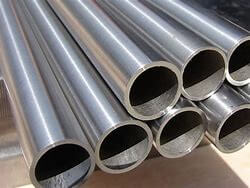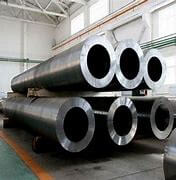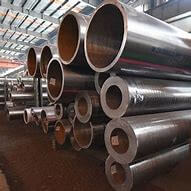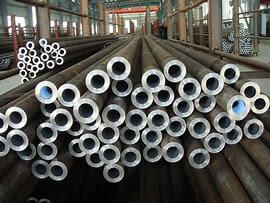N08825 is the material designation for a nickel-iron-chromium alloy known as Incoloy 825. It is a versatile alloy with excellent corrosion resistance in various aggressive environments, making it suitable for a wide range of applications in industries such as chemical processing, oil and gas, and marine.
Here are some key features and properties of Incoloy 825 (N08825):
Chemical Composition:
– Nickel (Ni): 38.0-46.0%
– Chromium (Cr): 19.5-23.5%
– Iron (Fe): 22.0% min
– Molybdenum (Mo): 2.5-3.5%
– Copper (Cu): 1.5-3.0%
– Titanium (Ti): 0.6-1.2%
– Manganese (Mn): 1.0% max
– Silicon (Si): 0.5% max
– Carbon (C): 0.05% max
Key Features and Properties:
– Corrosion Resistance: Incoloy 825 exhibits excellent resistance to a wide range of corrosive environments, including sulfuric acid, phosphoric acid, sulfur-containing atmospheres, seawater, and brines. It is particularly resistant to pitting, crevice corrosion, and stress corrosion cracking.
– High Temperature Performance: It retains good mechanical properties and corrosion resistance at elevated temperatures, making it suitable for applications involving heat and aggressive chemical environments.
– Excellent Weldability: Incoloy 825 can be easily welded using various techniques, including gas tungsten arc welding (GTAW/TIG), shielded metal arc welding (SMAW), and resistance welding. It exhibits good weldability and retains its corrosion resistance in the welded condition.
– Mechanical Strength: It offers a combination of high strength and good ductility, making it suitable for structural applications and components subjected to mechanical stresses.
– Thermal Stability: Incoloy 825 maintains its mechanical properties and corrosion resistance even after prolonged exposure to high temperatures.
– Non-Magnetic: It is non-magnetic in nature, which is beneficial in certain applications.
Applications:
– Chemical Processing: Incoloy 825 is widely used in the chemical processing industry for equipment and components such as reactors, vessels, piping systems, valves, and heat exchangers. It resists corrosion from various chemicals, acids, and alkalis, including sulfuric acid and phosphoric acid.
– Oil and Gas Industry: It finds applications in oil and gas processing facilities, offshore platforms, and pipelines. Incoloy 825 is used for downhole tubing, wellhead equipment, valves, and other components that are exposed to corrosive environments containing hydrogen sulfide (H2S), chlorides, and other corrosive elements.
– Desalination Plants: Incoloy 825 is employed in desalination plants for components such as evaporators, heat exchangers, and piping systems. It resists corrosion from seawater and brines, making it suitable for the harsh conditions of desalination processes.
– Marine and Shipbuilding: Incoloy 825 is utilized in marine applications, including seawater piping systems, heat exchangers, and fittings. It provides excellent resistance to corrosion in marine environments.
– Pollution Control: It is used in pollution control equipment such as scrubbers, flue gas desulfurization (FGD) systems, and exhaust gas cleaning systems, where resistance to corrosive gases and acids is required.
– Nuclear Industry: Incoloy 825 is employed in nuclear power plants for applications such as fuel element dissolvers, waste handling equipment, and heat exchangers in radioactive environments.
– Pharmaceutical and Food Processing: It is suitable for applications in the pharmaceutical and food processing industries, where corrosion resistance and cleanliness are important factors.
These are some common applications of Incoloy 825 (N08825). The specific selection and use of Incoloy 825 will depend on the specific requirements and conditions of the application. It is recommended to consult with materials and engineering experts to determine the suitability of Incoloy 825 for a particular application.
Flange plates made from Incoloy 825 (N08825) can be utilized in various applications where corrosion resistance and durability are essential. Here are some common applications where flange plates made from Incoloy 825 are commonly used:
1. Chemical Processing: Incoloy 825 flange plates are employed in chemical processing plants, particularly in corrosive environments where resistance to acids, alkalis, and other chemicals is crucial. They can be used in chemical reactors, piping systems, valves, and other equipment that come into contact with corrosive substances.
2. Oil and Gas Industry: Incoloy 825 flange plates find applications in the oil and gas industry, both upstream and downstream. They are used in offshore platforms, refineries, and petrochemical plants, where they provide excellent resistance to corrosive fluids, such as seawater, sour gases, and hydrocarbons.
3. Desalination Plants: Flange plates made from Incoloy 825 are utilized in desalination plants where seawater is converted into freshwater. They are employed in various components, including pumps, heat exchangers, and piping systems, where resistance to corrosion by seawater and brines is required.
4. Marine and Shipbuilding: Incoloy 825 flange plates are commonly used in marine applications. They are employed in seawater piping systems, heat exchangers, and other components that are exposed to corrosive marine environments.
5. Power Generation: Flange plates made from Incoloy 825 find applications in power generation facilities, including nuclear and fossil fuel power plants. They are used in components such as heat exchangers, condensers, and piping systems that are exposed to high temperatures, steam, and corrosive environments.
6. Pharmaceutical and Food Processing: Incoloy 825 flange plates are utilized in pharmaceutical and food processing industries where corrosion resistance and cleanliness are critical. They can be used in processing equipment, reactors, storage tanks, and piping systems.
7. Pollution Control: Flange plates made from Incoloy 825 are employed in pollution control systems such as scrubbers, flue gas desulfurization (FGD) units, and exhaust gas cleaning systems. They provide resistance to corrosive gases, acids, and other pollutants.
8. Water Treatment: Incoloy 825 flange plates find applications in water treatment facilities, including wastewater treatment plants and industrial water treatment systems. They can be used in components such as pumps, valves, and piping systems where resistance to corrosive chemicals is required.
These are some common applications where flange plates made from Incoloy 825 are used. The specific application and selection of Incoloy 825 flange plates will depend on factors such as the corrosive environment, temperature, pressure, and overall system requirements. It is advisable to consult with materials and engineering experts to determine the suitability of Incoloy 825 flange plates for a particular application.




